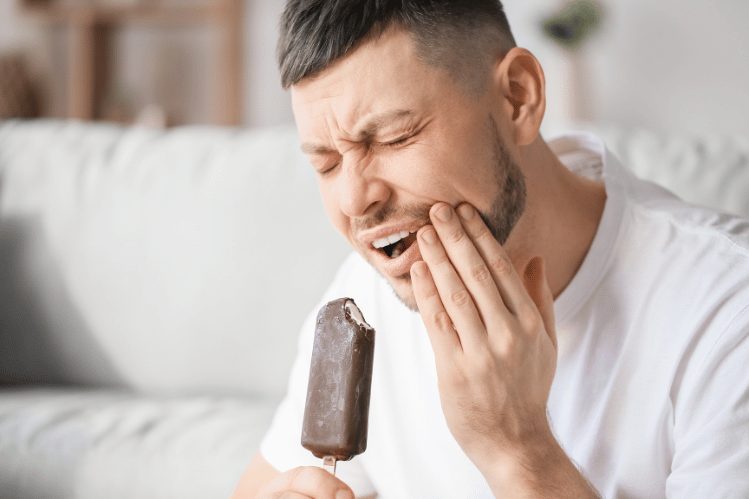
Table of contents
- Tooth Sensitivity: Causes, Treatment, and Prevention
- What is teeth sensitivity?
- Why Do My Teeth Feel Like This?
- Potential Causes
- Care and Treatment
- Prevention is Key
- Maintain good oral hygiene
- Use a soft-bristled toothbrush
- Visit your dentist on a regular basis
- Restrict acidic meals and beverages
- Conclusion
Teeth sensitivity can be brought on by inhaling cold air or consuming hot, cold, sweet, or sour meals and beverages. Sharp, abrupt pain that travels deep into the tooth's nerve endings is possible. In this blog, we’ll examine the tooth sensitivity causes, and prevention. Dental bonding, desensitizing toothpaste, and fluoride are among the treatments.
What is teeth sensitivity?
When the dentin, the layer that lies beneath your teeth, is exposed, it usually causes teeth discomfort. Gum recession—your gums pushing away from your teeth and exposing the roots—and erosion—wear and tear—are two potential reasons for this. The thousands of tiny tubules in dental roots that aren't covered in hard enamel lead to the pulp, the center of your tooth.
Dental sensitivity may also be an indication of other problems, such as gum disease, cavities, or fractured teeth.

Why Do My Teeth Feel Like This?
Have you ever taken a mouthful of hot soup or nibbled on some ice cream and then experienced pain or discomfort? Then you are not by yourself. Pain that is brought on by hot or cold food may indicate a cavity, but it is also frequently experienced by those with sensitive teeth.
Tooth sensitivity, sometimes known as "dentin hypersensitivity," is precisely what it sounds like: discomfort or pain in the teeth in reaction to particular stimuli, like changes in temperature. It might affect one tooth, multiple teeth, or all of a person's teeth. It can also be a transient or long-term issue. Although there are many potential causes, most cases of sensitive teeth can be resolved with simple adjustments to your oral care routine.

Potential Causes
Why do teeth suddenly become sensitive?
Sensitive teeth can occur due to a variety of circumstances, such as:
Brushing too hard
Excessive brushing force or the use of a toothbrush with strong bristles can erode enamel over time and reveal dentin. Gum recession, or the separation of your gums from your teeth, is another effect of it.
Gum recession
Thin gum tissue is a result of genetics in certain individuals. Periodontal disease results in gum recession in some people. Gum recession causes your gums to recede from your teeth, exposing the roots.

Gum disease
Since the absence of supporting ligaments exposes the root surface, which goes straight to the tooth's nerve, inflamed and painful gum tissue may cause sensitivity.
Broken or chipped teeth
The pulp of the tooth may become inflamed when bacteria from plaque enters the cavity.
Teeth grinding
Clenching or grinding your teeth can erode the enamel and reveal the dentin underneath.
Products for teeth whitening
These are a main cause of tooth sensitivity. See a dentist about teeth whitening for sensitive teeth if you wish to brighten your smile
Age
Between the ages of 25 and 30, teeth sensitivity peaks.
Build-up of plaque
Sensitivity may result from the presence of plaque on the root surfaces.
Mouthwash use
If your dentin (the middle layer of your teeth) is exposed, several over-the-counter mouthwashes include acids that can increase your teeth's sensitivity. The acids also cause extra damage to the tooth's dentin layer. Consult your dentist about using a neutral fluoride solution if you experience dentin sensitivity.
Acidic foods
Consuming foods high in acid on a regular basis, including tomatoes, pickles, citrus fruits, and tea, can erode enamel.
Recent dental procedures
Fillings, tooth cleanings, and the implantation of dental restorations might cause sensitive teeth in some people. Dental operations might temporarily produce sensitivity, which typically goes away in four to six weeks.
Care and Treatment
How can discomfort from sensitive teeth be stopped?
The cause determines the course of treatment. Make sure to make an appointment with your dentist if you experience persistent discomfort or sensitivity in your teeth. Before they can suggest the best course of action, they must rule out any dangerous conditions.
To lessen the possibility of dental discomfort from typical wear and tear:
Apply desensitizing toothpaste
Toothpaste for sensitive teeth comes in a variety of brands. Your sensitivity should reduce with continued use. To discover the product that is ideal for you, you might need to test out a few various brands. Another piece of advice is to use a Q-tip or your finger to apply a small layer of toothpaste such as fluoride on your exposed tooth roots before bed.
Utilize fluoridated dental products
Applying a fluoride mouthwash on a daily basis can reduce sensitivity. Find out what products you can use at home from your dentist.
Fluoride Treatments
Prescription toothpaste or topical fluoride can build enamel and lessen sensitivity.
Speak with your dentist if the pain persists. Certain dental procedures, such as the following, may help lessen sensitivity:
- Dental bonding to seal the surfaces of exposed roots.
- Varnishes containing fluoride applied to the exposed root surface.
- Dentin sealants are used on the root surface that is visible.
Prevention is Key
Although sensitivity that already exists can be addressed by treatment, it is preferable to avoid it altogether. The following advice is preventive:
Maintain good oral hygiene
To get rid of the plaque and germs that cause gum disease and enamel erosion, brush twice a day and floss frequently to keep up good oral hygiene by continuing to clean your teeth and mouth completely
Use a soft-bristled toothbrush
Stay clear of rough brushing as this might erode enamel.Employ a toothbrush with soft bristles to reduce brushing abrasion on tooth surfaces and gum discomfort.
Keep an eye on your diet
Eating acidic meals on a regular basis can erode tooth enamel over time and exposed dentin. Additionally, they could intensify sensitivity and initiate a pain response.
Visit your dentist on a regular basis
Get regular cleanings, fluoride treatments, and professional exams.
Restrict acidic meals and beverages
Water is a better option; avoid sugary and acidic drinks since they might damage enamel.
Conclusion
Your grin shouldn't have to be constrained by sensitive teeth. You may take charge and avoid those pains by being aware of the possible reasons, looking into treatment alternatives, and putting preventive measures in place. Always remember that maintaining a healthy, pain-free smile for life can be achieved via consistent dentist appointments, attentive eating habits, and strict oral cleanliness.So put an end to the b accept the information, and let your smile brightly!
FAQs
1. What are the main root causes of tooth sensitivity?
Gum recession, chipped teeth, worn-down enamel, gum disease, and recent dental work.
2. Can sensitivity result from too much brushing?
Indeed, vigorous brushing can erode enamel and reveal dentin, which can cause pain.
3. Do particular foods and drinks enhance sensitivity?
Yes, chemicals that are hot, cold, acidic, or sugary can cause discomfort.
4. Which kind of toothpaste is best for sensitive teeth?
Seek for toothpastes with desensitizing compounds such as stannous fluoride or potassium nitrate.
5. Are there any effective over-the-counter medications?
While some over-the-counter medications may offer short-term relief, seeking advice from your dentist is essential for long-term fixes.
6. Which dental operations can treat sensitive teeth?
Options include gum grafting, bonding, root canals, and fluoride treatments, depending on the cause.

